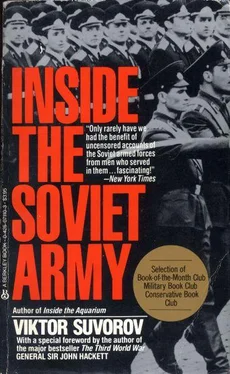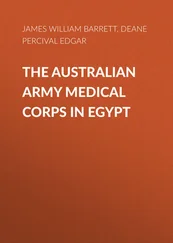Until some years ago, officers were trained at military schools. The courses lasted between two and three years, depending on the arm of service concerned. These schools gave a medium-level military education and the students became lieutenants upon the completion of their studies. At the beginning of the 1960s, Khrushchev, who was going through a peace-loving phase, threw 1,200,000 officers and NCOs out of the Army. A Soviet officer has no contract or other guarantee of tenure and so, if someone still had a couple of months to go to complete 25 years of service, he was simply dismissed, with the tiniest of pensions if he was lucky. If he still had some days to serve before completing 20 years of service no matter how unblemished he was kicked out without anything. Most of these unfortunates were officers who had served at the front and had undergone the worst horrors of the Second World War.
The Party was delighted, because they were able to reduce expenditure considerably. However, these short-term gains eventually led to colossal expense. For many years, no one had the slightest desire to become an officer — you give the Army 24 years of your life and then they drive you out like a dog: what happens to you then? Immediately after the fall of Khrushchev, steps were taken to restore the prestige of officers. Their uniforms were improved, their salaries were increased, and they were given a number of additional privileges. But this did not cause young men to rush to join the colours. They wanted permanent guarantees for the future. A current joke ran: `If you can go to a tank training school — and they throw you out, you can become a tractor driver. If you go to a flying school, you can get straight into Aeroflot if you are sacked, but what will happen to political officers, if they make more cuts in the Army? The answer was: `Political officers can easily get jobs with the post office, sticking stamps on envelopes, because they have such long tongues.
The solution which was found eventually was a good one for individuals as well as for the State. All military training schools were to be upgraded from medium to higher educational establishments and every student was to receive a university education and to be trained for a civilian profession, as well as for an army career.
First, the course of instruction given at the infantry training schools was reorganised, since it was the infantry which was feeling the shortage of junior commanders most acutely. The length of the course was increased from two years to four. Graduates from the school continued to emerge with a medium-level military education and the rank of lieutenant, but from now on they also received a higher general education, a normal university diploma and civilian professional training. The civilian professions for which those attending Higher Military Training Colleges are prepared normally include automobile engineering and the teaching of mathematics, physics, history, geography and foreign languages. Once the infantry training schools had been reorganised in this way. Colleges for tank, airborne and artillery officers were set up, and then, finally, others to serve the remaining arms of service.
2
At present there are 154 Higher Military Training Colleges in the Soviet Union. Their courses last for between four and five years. Each College has about 1,000 students and each therefore turns out between 200 and 250 lieutenants a year. Each has a Major-General, a Lieutenant-General or even a Colonel-General as Commandant.
In selecting a College one is, of course, completely ignorant of the choices which are available. Once a year the Army newspaper Krasnaya Zvezda publishes a long list of Colleges, together with their addresses and very brief explanatory notes on each.
You study this, scratch your head and plump for one of the Colleges which seems to cater for your interests. However, there are usually several which specialise in each field of study — thus, for instance, there are seven tank colleges. Some people choose the one closest to their homes but others may select one which is far away, in Central Asia or the Far Eastern Military District, because it is easier to get into.
However, there is so little information in the newspaper that you cannot even form the vaguest idea of what lies ahead of you. For instance, in the Tashkent Tank Officers Training College, in addition to the normal faculties, there is another faculty which trains tank officer cadets for service with the Airborne Forces. When you pass your examinations, you receive your officer's shoulder-boards and swear your oath of allegiance and then you suddenly find, to your great surprise, that you are to begin parachute training very shortly and that you are going to spend all your life jumping out of aircraft, until you break your neck.
The Moscow Officers Training College has no faculties at all, the one in Kiev, although it is in exactly the same category, has both general and reconnaissance faculties, and in Baku there is a marine infantry faculty. In Blagoveshchensk there is a specialist faculty which trains officers for work in Fortified Areas, and in Ryazan, besides a normal faculty, the Airborne Officers Training College contains a faculty which trains officers for diversionary units.
The young entrant, of course, knows none of this, so he may therefore end up, quite unintentionally, in a diversionary unit, in the marine infantry — or, indeed, anywhere else at all.
The situation is the same in the Air Force Officers Training Colleges — one trains fighter pilots, another pilots for transport aircraft and a third those who will fly long-range bombers for the Navy. But, of course, no one will explain this to you before you enter that particular college.
This is, perhaps, not so bad, but there are many Colleges about which nothing at all is said. For instance, the Serpukhov Engineer Officers Training College. If you look at the papers set for its entrance examinations, you will realise that they are unusually difficult. Some people are put off by this but it attracts others. If you succeed in gaining a place there, you will discover, during your second year, that you are being trained for service with the Strategic Rocket Forces.
3
Having chosen a College which appears to cater for your interests, even though you have no real idea what it offers, you should immediately apply to its commandant, saying that you want to become an officer and explaining what you want to do, attach your school-leaving certificate, references from your school and from the Komsomol and send everything off as quickly as possible to the College. In due course you will be summoned to sit the entrance examination.
My own choice was straightforward — the Kharkov Guards Tank Officers Training College. I scribbled my way through four exams, without particular difficulty. They tested me to find out what level I had reached at school, but it was clear that the standard of my knowledge was not particularly important and that they were more interested in my speed of reaction, in my general level of development and in the range of my interests. More important than the written tests were the medical examinations and the tests of physical development. Secretly, before candidates were summoned to the examinations, of course, enquiries about them had been made with the local KGB offices; nothing was done until these were completed. The decisive part of the selection process, however, was a discussion which lasted for several hours, during which one's suitability — or lack of it — for commissioned rank in the Soviet Army was explored. The assembly line moves fast. Three or four applications are usually received for each vacancy. Every evening there is a parade, at which one of the officers reads out the names of those who have been given a place and of those who have been rejected. Every morning, a new batch of hopefuls arrives and every evening, after a week spent at the College, groups of disappointed would — be entrants leave. If they have not done their military service they will be called up before long.
Читать дальше












